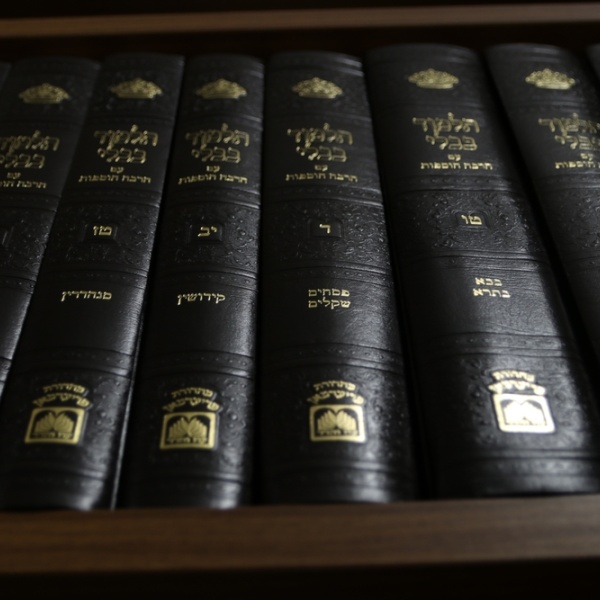
We have previously referred to the special leniency that allows a woman to remarry on the testimony of one witness. This was a most revolutionary innovation, one that seemingly violates a fundamental precept of the Torah: the basic requirement for two witnesses. Compounding the problem was the fact that the stakes were so high--adultery, illegitimate children, and the undermining of the holiness of marriage--and it is no wonder this law was not readily accepted. “Rabbi Akiva said, when I went down to Neharda to calculate the years, I found Nechamia, the man of the house of D’li; and he said to me, 'I heard that they do not let a woman remarry on the basis of one witness except for Rav Yehuda ben Babba', and I told him that is so. 'Tell them', he said to me, 'In my name, I have this tradition from R. Gamaliel the Elder: that a [married] woman may be allowed to marry again on the evidence of one witness'” (Yevamot 116a). Nonetheless, despite this tradition[1], Rabbi Eliezer and Rabbi Yehoshua did not allow a woman to be married upon the testimony of one witness, nor did Rabbi Akiva himself fully accept this law.
Interestingly, this leniency was initially accepted by Beit Shammai, but not by Beit Hillel. The latter limited it to the one particular case where the rabbis allowed a woman to marry on the basis of one witness, refusing to extend it to any other case. Yet when Beit Shammai explained that that case was just a template--much like the laws regarding damages caused by an ox, which are not limited to oxen--"Beit Hillel returned to rule in accordance to Beit Shammai” (Yevamot 116b). This change of heart came about not because any proofs were brought but rather, Beit Hillel were open enough to reexamine their view because of logic alone.
However, freeing a woman to marry--as important as that is--does not mark the end of the story. “Beit Shammai says she marries and collects her ketuba, and Beit Hillel says she marries but does not collect her ketuba[2]” (Yevamot 116b).
As Beit Shammai notes, “You permitted [what might be] the grave [prohibition] of illicit relations; shall we not permit the [taking of her husband's] money, which is of lesser importance?” If we can accept one witness when the stakes are so high, surely we should accept one witness when the stakes are so much lower. To this, Beit Hillel responds that we would not allow the brothers to inherit the assets of their presumably deceased brother based on the testimony of one witness. As Rashi explains, the Torah requires two witnesses and there is no reason to relax this rule so the brothers can inherit. It is precisely because the stakes are so high regarding marriage that we allow one witness. If not, this woman might be permanently unable to marry nor have children. The rabbis bent over backwards to prevent that. But monetary issues are of much lesser significance, and we are not going to look for ways to “circumvent” the Torah’s demand for two witnesses.
Beit Shammai do not directly respond to this argument--perhaps they agree with it--but offer an argument from the ketuba, though the ketuba itself is only a rabbinic document. The standard text of the ketuba reads “that if you marry another, you can receive that which I write [in the ketuba] to you”. The laws governing monetary matters and personal status may allow for and require differing levels of evidence. However, creating a situation where the bond of marriage is severed regarding living arrangements itself, but remains intact vis a vis the financial relationship, is something Beit Shammai wanted to avoid. To do otherwise would look strange from a legal standpoint--allowing a woman to remarry, i.e., the husband must be dead; yet refusing to give the wife her ketuba, i.e., the husband must be alive. Additionally, it does not bode well for a new marriage to start while financial arrangements are still outstanding from a prior marriage. While this is quite common in the Western world, the Torah preferred a clean break. It is for this reason that Judaism rejected monthly alimony in favor of a lump sum payment to be made upon dissolution of the marriage. Hence, while not required, the husband would add this clause to the ketuba[3].
And once again, the Mishnah concludes, “and Beit Hillel returned to rule in accordance with Beit Shammai”.
[1] Generally, a tradition from a great authority carries even more weight than a law derived from the text itself.
[2] While in the context, it may appear petty to argue over money, human nature tells us otherwise. Even people whose lives are miraculously saved will, after initial feelings of joy and thanksgiving (and likely, prayer that if their lives are saved, they will change their ways), often seek financial compensation.
[3] This enforced consistency is only applied to the marriage itself. While the wife can marry and hence, collect her ketuba, with regard to the brothers, they would not receive their share of the inheritance.
